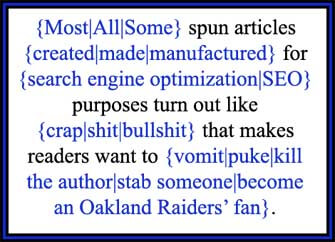Google Search AI Empowered By Romance Novels
 This may sound a little weird, right? Recently I wrote an article on Google’s RankBrain. Essentially, it is a part of Google’s algorithm which is noted as the third most important aspect of Google’s rankings – behind links and content. RankBrain is an AI which handles queries to effectively teach itself and return better results as it receives our input queries.
This may sound a little weird, right? Recently I wrote an article on Google’s RankBrain. Essentially, it is a part of Google’s algorithm which is noted as the third most important aspect of Google’s rankings – behind links and content. RankBrain is an AI which handles queries to effectively teach itself and return better results as it receives our input queries.
Sometimes, queries are given to Google in the form of questions. Other times, the query is written in a conversational way. These are the types of queries which Google extensively uses RankBrain to help return better results.
Buzzfeed has just announced that, in order to improve Google’s AI abilities to understand questions and conversational queries, has started crunching over 3000 romance novels. It turns out that romance novels are typically written in conversational tone, containing many quoted questions. As such, it is the perfect avenue for Google’s AI to teach itself conversational grammar.
has just announced that, in order to improve Google’s AI abilities to understand questions and conversational queries, has started crunching over 3000 romance novels. It turns out that romance novels are typically written in conversational tone, containing many quoted questions. As such, it is the perfect avenue for Google’s AI to teach itself conversational grammar.
Following is an excerpt of the type of content they claim to be analyzing:
“Her blouse sprang apart. He was assaulted with the sight of lots of pale creamy flesh bursting out of a hot pink bra, the cleavage high and perky. It was a gorgeous surprise, all that breast she’d been hiding under her crisp tailored shirts.”
While certainly racy, these books are providing grammatical examples of regular converational English usage. Most people, when typing their query in Google, do not use proper grammar – but use a more conversational style of writing.
It is doing the trick. Google has recently had luck in reformatting sentences in a conversational style, the same style as studied in the romance novels.
Google’s AI engine, known as the neural network, is a system that can learn on its own. After ingesting 2865 romance novels, it has learned to construct flawless conversational English. Google engineers in charge of the system say that, theoretically, the system could now write its own novels.
 What does this mean for your SEO? I think the application of this knowledge to your SEO skills should be that Google is advancing light years beyond what they ever were capable of before. Just four short years ago, Google couldn’t distinguish (or, at least, it didn’t appear to be able to distinguish) badly spun articles or low quality link schemes. Today, they have an AI system that is perfectly well able to analyze the grammar of your articles, compare it to other documents on the internet to see if it is distinct enough from other works, and know whether the subject matter is well written based on other documents on the internet covering the same subject matter.
What does this mean for your SEO? I think the application of this knowledge to your SEO skills should be that Google is advancing light years beyond what they ever were capable of before. Just four short years ago, Google couldn’t distinguish (or, at least, it didn’t appear to be able to distinguish) badly spun articles or low quality link schemes. Today, they have an AI system that is perfectly well able to analyze the grammar of your articles, compare it to other documents on the internet to see if it is distinct enough from other works, and know whether the subject matter is well written based on other documents on the internet covering the same subject matter.
 You see this in many of the patents Google has applied for covering search results. Google is able to analyze linking patters and discover manipulation with footprints in ways that are far beyond what they were when Google started its punitive algorithm changes back in 2012. By advancing their technology, they are able to weed out badly spun content, low quality rewritten content and low quality automatically generated content.
You see this in many of the patents Google has applied for covering search results. Google is able to analyze linking patters and discover manipulation with footprints in ways that are far beyond what they were when Google started its punitive algorithm changes back in 2012. By advancing their technology, they are able to weed out badly spun content, low quality rewritten content and low quality automatically generated content.
While this closes the door on many blackhat and other types of ranking manipulations of the past, it also opens the door based on the vast majority of webmasters who have been weeded out. Hard work put into manually writing content, manual link building and difficult outreach to gather links has never been as rewarded as it is today.
 The standard has been raised, the bar of entry is significantly higher now. An SEO who is aware of best practices in SEO, though it is a lot of work, is able to achieve better and lasting results compared to years ago. It used to be that anyone could purchase push-button software or hire out the creation of hundreds of thousands of links and manipulate their rankings quite easily. This is much more difficult today, and if you work hard in learning proper SEO practices – you’ll notice it’s much more difficult for blackhat hacks to steal your rankings today, compared to even a year ago.
The standard has been raised, the bar of entry is significantly higher now. An SEO who is aware of best practices in SEO, though it is a lot of work, is able to achieve better and lasting results compared to years ago. It used to be that anyone could purchase push-button software or hire out the creation of hundreds of thousands of links and manipulate their rankings quite easily. This is much more difficult today, and if you work hard in learning proper SEO practices – you’ll notice it’s much more difficult for blackhat hacks to steal your rankings today, compared to even a year ago.
I would not at all be surprised if Google had written a self-training AI bot whose task was to seek out private blog networks, or paid link schemes, or other types of ranking manipulation. That is why it is so important, when creating a private blog network, to follow best practices. I’ve created a series of articles on how to build a private blog network. I would highly recommend you follow its advice if you are building links to your site through blogs you create and control – whether you host them ourself, or build them as free blogs on sites such as Blogger, WordPress, Tumblr, etc.
This is the future of SEO. Moving forward, blackhat techniques (even if you find they currently work) are being phased out and are likely to be more harmful than beneficial. Quality blogs, with quality content powered by quality outreach link building are doing well in 2016.

Google hasn’t exposed the AI directly to the public yet. Recently, Microsoft released a chatbot named Tay – it learned by input from social media. However, people tried to corrupt the software, and after repeating weird and socially unacceptable wording to the bot, it became genocidal. After a while, it began repeating racist comments – and had to be shut down from accepting input that was potentially corrupt.
In summary, taking a path down a more whitehat route is a good strategy. If Google can actually determine the quality of your content, think twice about hiring out your content production to cheap writers. If you do, instruct them to not simply rewrite other articles they find, as Google has the intelligence to know whether an article is simply rewritten (or spun). Last, assume that Google will become more efficient at weeding out spam and low quality content as time passes.

Comments